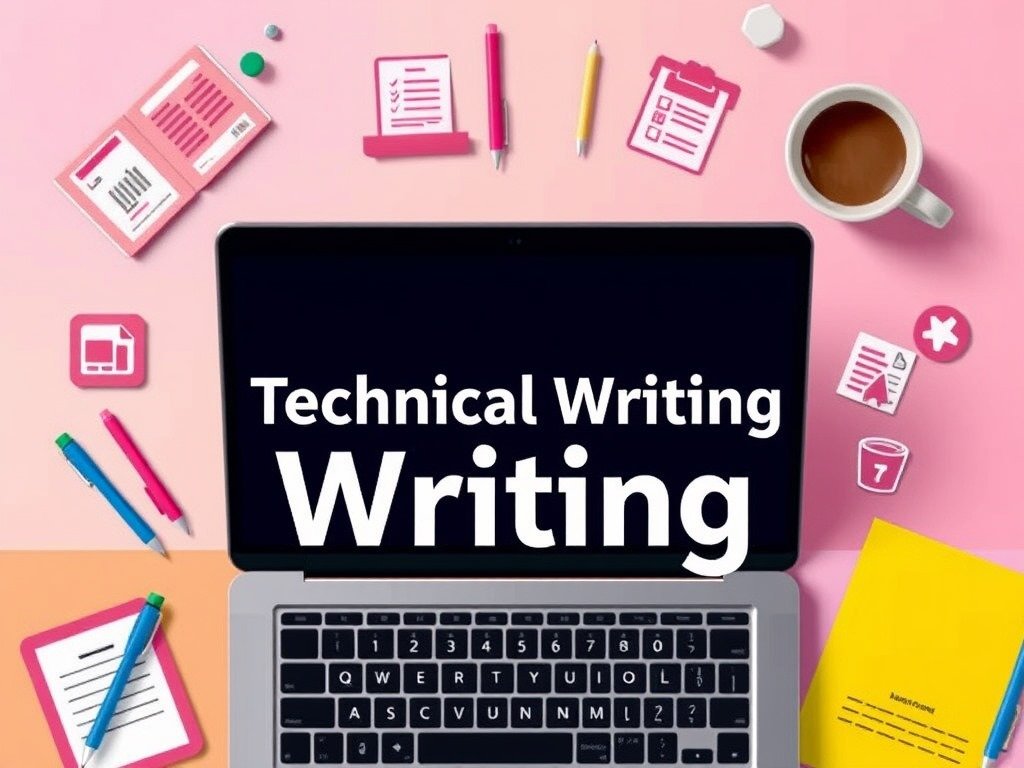In today’s rapidly changing technology landscape, effective and precise communication has never been more important. Technical writing is where this comes in handy. If you like explaining things in detail and are a writer by heart, a career in technical writing may be just the thing for you. This post will explore what technical writing is, how it works, types of technical writing, earning potential, tools used, long-term career prospects, work-life, and sources for ongoing education.

What is Technical Writing?
Technical writing is a technical communication that delivers complex information in a comprehensible and clear manner. Technical writing is extensively used in technology, engineering, healthcare, and finance industries. Technical writing is mainly used to inform or instruct the readers, primarily through manuals, user guides, reports, and other documents.
How Technical Writing Functions
Technical writing is a process with several steps:
Research: The subject needs to be understood. Writers typically collaborate with SMEs to acquire proper information.
Planning: Organizing content rationally aids in clarity. Outlines are prepared and the best format for the paper is determined.
Online Help Systems: Computer-imbedded help systems, presented as tooltips or help menus within computer programs.
Writing: Writing itself is the application of simple language, refraining from technical jargon, and ensuring target user requirements.
Editing: The manuscript has to be read for coherence, clarity, and technical accuracy. It may comprise peer review and SME input too.
Publishing: The document is finally formatted and published in the desired mode, which can be digital or hard copy.
Types of Technical Writing
Technical writing comes in various styles and forms, all of which are catering to targeted audiences and intents:
User Manuals: Writings that inform readers how to use a product or application.
Instructional Guides: Step-by-step instructions to performance of activity or procedure.
API Documentation: Technical explanations and requirements for programmers on how to use an application programming interface (API).
Reports: Official reports including facts of investigation, conclusions, or inspection.
Proposals: Reports containing recommendations or outlining proposals for projects, typically for funding or approval.
Technical Specifications: Phrases that identify the requirements and capabilities of a system or product.
Online Help Systems: Context-sensitive so-called “help” which is integrated into software packages and usually screens as tooltips or help menus.
Income Potential in Technical Writing
Technical writing possesses one of the most attractive aspects of competitive income potential. Newcomers can expect the following:
Annual Income
Entry-Level Positions: $50,000 – $70,000
Mid-Level Positions: $70,000 – $100,000
Senior Positions: $100,000 – $130,000+
Monthly Income
Entry-Level Positions: Approximately $4,200 – $5,800
Mid-Level Positions: Approximately $5,800 – $8,300
Senior Positions: Approximately $8,300 – $10,800+
Weekly Income
Entry-Level: Approximately $1,000 – $1,400
Mid-Level: Approximately $1,400 – $1,900
Senior: Approximately $1,900 – $2,700+
These are the earning capacities in technical writing, which is why it becomes a desirable career option for individuals who have the necessary skills and diligence.
How to Begin a Technical Writing Career
If you wish to pursue a career as a technical writer, the following are some attainable steps to allow you to begin:
1. Develop Basic Skills
Begin by learning fundamental writing abilities. Stress the ability to express oneself clearly, concisely, and technologically. Pursue writing classes that concentrate on technical writing in an effort to understand the certain skills utilized within the profession.
2. Gain Appropriate Experience
Obtain secure internships, volunteering, or freelancing to build your portfolio. Working on open-source projects or documentation for small companies may be an excellent learning opportunity.
3. Find out about the Tools and Software
Technical writers will typically possess technical tools to use while composing and structuring documents. Find out about:
Microsoft Word: Typically used to create documents.
Madcap Flare: A preferred tool to create online help and documentation.
Adobe FrameMaker: Utilized for detailed documents and publication.
Snagit: A software to capture screen shots to build visuals.
Confluence: An office space where teams come together to manage documentation.
4. Networking Opportunities
Networking is a crucial aspect of the technical writing career. Seek organizations such as the Society for Technical Communication (STC) to connect with other professionals and gain insight into industry trends. Network by engaging in webinars, workshops, and conferences in an effort to discover potential mentors as well as future employers.
Long-Term Career Opportunities
As new technologies continue to evolve, demand for technical writers is continuously growing. With new software, new hardware, and new technologies, effective documentation is more important than ever. You can be considered for many career paths as a technical writer, which can develop into advancement and specialization.
1. Senior Technical Writer
You can move into a senior technical writer role with experience. You would be given a more complex technical project involving complex technologies or systems. Senior writers also help to develop junior writers acting as a mentor and providing guidance on best practices. The position allows for creative input in project planning and could involve collaboration with cross-functional teams.
2. Technical Communicator
Aside from traditional writing, a technical communicator’s work is focused on content strategy and user experience. It is a role that involves staying attuned to user needs and making documentation what they need. Technical communicators typically work with UX designers and product managers to create user-friendly documentation, which enhances the overall product experience.
3. Content ManagerIf:
you have aspirations to lead, the role of a content manager could be a step up. As a content manager, you’ll be managing documentation-based projects and a team of writers. You will decide what the standards of documentation is, help establish consistency of materials and develop content plans that align with the business’s needs. Many times you will need project management experience and the ability to manage more than one at a time.
4. Freelance Technical Writer:
Another potential career path, is as a freelance technical writer. Freelance work has the potential for a lot of flexibility and there is the option to do various projects in different industries. Freelancing enables you to select clients and projects that appeal to you, offering variety in your work. But it also demands high self-discipline and the capacity to manage your business, such as marketing your services and dealing with client relationships.
These diverse job prospects illustrate the versatility of technical writing and scope for growth within the profession, and thus make it a more desirable choice for those who wish to build a career spanning their working life.
Short-Term Career Opportunities
Short-term technical writing offers you a range of entry-level options to enable you to get a good hold over the field. Given below are some key roles:
1. Junior Technical Writer: As a junior technical writer, you’ll be assisting senior writers in the creation of documentation and learning the ropes. You will create user manuals, guides, and help documentation while using on-the-job training and mentorship. It’s a fantastic way to learn and gain experience in the field of technical writing.
2-Technical Writing Intern: Internship is a great way to get field experience in a professional environment. You might work on a variety of projects, write documentation and get the chance to learn from other members of the team as a technical writing intern. This can help your resume significantly and you’ll gain some connections in the industry.
3. Content Developer : As a content developer, you could create instructional content, presentations or help documentation for software programs. In this role, there is an opportunity for you to use your writing skills and creativity along with an opportunity to learn about user experience and content strategy.
4.Documentation Specialist: As a documentation specialist, you will be involved with updating, maintaining, and organizing existing documentation. This role involves working with various stakeholders so that all documents are correct and accessible. You will develop an understanding of documentation processes and standards within the organization. With the establishment of your attention to detail and organizational abilities, you will have a significant impact on the usability and clarity of technical material.
This position is the perfect stepping stone to a technical writing career advancement, as it serves as a learning platform of what the best practices are and how communication should be done.

Work Flexibility and Work-Life Balance
Flexibility is highly likely to be one of the most attractive aspects of a technical writing career.A majority of technical writers work at home, something that offers a fine work-life balance. Flexibility can lead to increased levels of job satisfaction and productivity given that you will be working where it is suitable for your needs. Additionally, the fact that you create your own schedule generally means that you can handle personal responsibilities effectively.
Recommended Resources for Continuing Education
To stay current in technical writing, the following materials can be considered:
Books
“Technical Writing for Dummies” by Julie M. Zietlow: The ultimate guide for the novice.
“William Strunk Jr’s ‘The Elements of Style’. and E.B. White: A classic on concise writing.
“The Chicago Manual of Style”: Every writer’s bible.
Podcasts
“The Writer’s Digest Podcast”: Offers insights into various genres of writing, including technical writing.
“The Technical Writer’s Podcast”: Covers technical writing trends and tools only.
YouTube Channels
Tech Writer Hub: Provides tutorials and tips on technical writing.
Simpletivity: Addresses productivity and tools that pertain to technical writers.
Common Challenges and Solutions
Even though technical writing is a rewarding career, novice writers typically face several challenges. Here are some common challenges and practical solutions:
Understanding Complex Subjects:
Challenge: Technical writers typically need to comprehend complex technologies or processes within a limited timeframe.
Solution: Collaborate with subject matter experts (SMEs) and conduct thorough research. Ask questions to clarify concepts and create detailed outlines to organize information logically.
Writing for Diverse Audiences:
Challenge: Differing technical ability in various audiences poses a challenge to being capable of effectively customizing content.
Solution: Determine your reader’s need and adapt your style of writing. Use plain language to the man on the street and technical terminology to technical readers. Use graphics to facilitate comprehension.
Consistency:
Challenge: It is difficult to achieve very high levels of consistency in words, structure, and style of documents.
Solution: Create a style guide, that lists the approved words, the format style, and, the design options. MadCap Flare and Confluence allow you to keep documentation standards intact.
Time Management: Challenge: It is exhausting, and stressful to always be switching gears between multiple deadlines and projects.
Solution: Utilize project management tools (Trello or Asana) to set realistic deadlines and rank your priorities. Divide massive projects into micro tasks and keep the stress at bay.
Accepting Feedback:
Challenge: Peer or SME feedback can be useful but is sometimes unhelpful or generic.
Solution: Seek specific feedback with directed questions and requesting examples of wanted changes. This encourages constructive criticism and strengthens your writing.
Keeping Up with Technology:
Challenge: The rapidly changing technological landscape requires continuous learning and adaptation.
Solution: Keep yourself up to date by reading blogs within your industry, participating in webinars, and being involved with professional associations. Continue education with online classes and certifications.
Conclusion
Technical writing is a rewarding career that combines good writing ability with the ability to express complex information in a simple way. With decent compensation, flexible work arrangements, and a growing demand for skilled writers, it’s an excellent option to consider for 2025 and beyond. By acquiring new skills, gaining experience, and utilizing proper tools, you can have a successful career in this demanding field. Go for it, stay motivated, and never stop learning!
